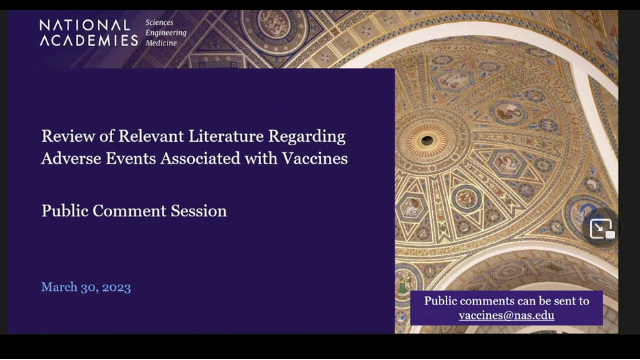
Story Summary
- Health care professionals expressed concern regarding absence of many adverse events;
- Public comments received by NASEM included many by individuals and health care professionals suffering injuries from COVID-19 shots;
- Attorneys stated concern relating to aggressive interpretation by DHHS and DOJ of previous NASEM reports stating inadequate evidence as evidence of no harm when government defends against vaccine injury compensation claims.
The following updates an NVIC article published March 23, 2023 with a summary of the National Academies of Sciences, Engineering and Medicine (NASEM) public comment session held March 30, 2023.
As background, the NASEM has appointed a committee at the request of the U.S. Department of Health and Human Services (DHHS) to review the relevant medical literature on adverse events associated with COVID-19 vaccines and shoulder injury related vaccine administration (SIRVA). NASEM announced late on March 22 that an online comment session would be held the following week on March 30 to provide an opportunity for the public to comment on COVID vaccine adverse events, including SIRVA.
The review of the epidemiological, clinical, and biological evidence by the NASEM committee charge requested by DHHS appears to be in preparation for the addition of COVID vaccine injuries to the Vaccine Injury Table (VIT) of the federal vaccine injury compensation program (VICP) created under the National Childhood Vaccine Injury Act of 1986. According to the NASEM presentation given to the Advisory Commission for Childhood Vaccines (ACCV) in December 2022, the report and its findings are expected in March 2024.1
Injuries Under Review
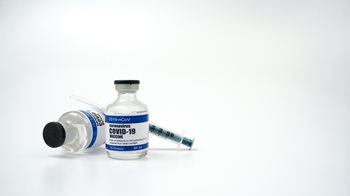 DHHS has asked the NASEM committee to review the medical literature to determine if the evidence indicates that COVID-19 vaccines are or are not causally associated with the following reported adverse events:
DHHS has asked the NASEM committee to review the medical literature to determine if the evidence indicates that COVID-19 vaccines are or are not causally associated with the following reported adverse events:
- Guillain-Barrè Syndrome (GBS)
- chronic inflammatory demyelinating
- polyneuropathy (CIDP)
- transverse myelitis (TM)
- Bell’s palsy
- hearing loss
- chronic headaches
- infertility
- sudden death
- myocarditis/pericarditis
- thrombosis with thrombocytopenia syndrome (TTS)
- immune thrombocytopenic purpura (ITP)
- thromboembolic events (e.g., cerebrovascular accident (CVA), myocardial infarction (MI), pulmonary embolism, deep vein thrombosis (DVT)
- capillary leak syndrome
The review of literature for SIRVA will be the second review by the NASEM, with the first SIRVA review published in their last report in 2012.2
Public Concern Regarding Adverse Events Not Under Review
The Mar. 30 virtual public comment session held by NASEM was live-streamed, with about 90 people viewing the online event, which included audio but no video of those making comments. NASEM provided only five days for the public to register to provide oral public comments and a time limit of three minutes was announced at the beginning of the session due to the high volume of public comment requests.
Many of the individuals speaking during the session were doctors, nurses and other health care providers, who had experienced severe reactions, injuries and permanent health problems following receipt of COVID-19 vaccines. None of the oral public comments addressed SIRVA.
Many individuals stated they were healthy and in good physical condition before vaccination but that after getting a COVID shot, they suffered significant deterioration of health with some having to give up their employment or sell their homes to cover costs of medical care. Most of those recounting what happened to them after they got COVID 19 shots were clearly upset that they had been healthy and had assumed the vaccine was safe, but are now struggling with permanent injuries.
Dr. Brian Dressen Ph.D. noted that there are many neurologic and inflammatory adverse event signals in the federal Vaccine Adverse Event Reporting System (VAERS) which are not included in the committee’s charge to review and asked for their inclusion in the NASEM review. Some commenters provided peer-reviewed journal titles for documented adverse events that have been left out of the review request to NASEM from DHHS, with many expressing concern and asking for their COVID vaccine adverse event to be included in the review.
Meryl Nass, MD, science advisor to Children’s Health Defense and a member of NVIC’s scientific advisory board, spoke about gaps in the efficacy and safety data used by the FDA in granting manufacturers an Emergency Use Authorization (EUA) to distribute COVID-19 vaccines in the U.S. She presented data from federal agencies and journal articles demonstrating that COVID vaccine efficacy waned to zero in five to seven months in adults and in children by six weeks.
Peter McCullough, MD called on NASEM to ask for the full withdrawal of all COVID-19 vaccines from the market “because they are not safe for human use.” He pointed to failure of the COVID vaccines to prevent disease; the high number of reported adverse events; the known safety signals in the safety data submitted by manufacturers to the FDA, as well as signals contained in VAERS.
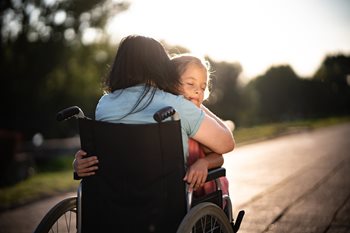 Professor Reneé Gentry, JD, director of the vaccine litigation clinic at Georgetown Law School and an attorney representing vaccine-injured clients in the VICP, commented on how reports issued by NASEM have been used by DHHS to delegitimize and contest injuries not appearing on the federal vaccine injury table. She noted that original stakeholders and parents of the vaccine injured who worked with Congress on the 1986 Act that created the VICP would find today’s VICP unrecognizable. As an example, she noted HPV claimants are leaving the VICP after 240 days to pursue civil lawsuits against vaccine makers because of the delegitimization and the real need for the safety net that the VICP was in its very early days.
Professor Reneé Gentry, JD, director of the vaccine litigation clinic at Georgetown Law School and an attorney representing vaccine-injured clients in the VICP, commented on how reports issued by NASEM have been used by DHHS to delegitimize and contest injuries not appearing on the federal vaccine injury table. She noted that original stakeholders and parents of the vaccine injured who worked with Congress on the 1986 Act that created the VICP would find today’s VICP unrecognizable. As an example, she noted HPV claimants are leaving the VICP after 240 days to pursue civil lawsuits against vaccine makers because of the delegitimization and the real need for the safety net that the VICP was in its very early days.
Aaron Siri, another attorney representing the vaccine injured, echoed many of the same concerns voiced by Gentry. He noted that any statements issued by the NASEM related to the committee’s review that suggest there is inadequate evidence to support or reject causation of a COVID vaccine injury, would be used by DHHS to argue there is an absence of evidence of harm. He added that this interpretation by DHHS could well be used against plaintiffs who have filed claims in the VICP. DHHS and attorneys at the U.S. Department of Justice representing the Secretary of DHHS in VICP claims often fail to acknowledge that lack of research into vaccine adverse events, which prevents definitive causation conclusions from being made, is a vaccine safety knowledge gap and not lack of evidence of harm done by vaccines.
Over the past four decades, the National Vaccine Information Center has repeatedly informed DHHS and the National Academy of Sciences that without methodologically sound biological mechanism and epidemiological research into vaccine adverse events, vaccine safety knowledge gaps will continue to foster public distrust in one-size-fits-all vaccine policies.3 4 5 6
Completing the Liability-Free Pathway for COVID-19 Vaccines to the VICP
As noted in a previous NVIC article about our 2021 correspondence with the U.S. Department of Health Resources & Services Administration (HRSA) on COVID-19 vaccine inclusion in the federal vaccine injury compensation program (VICP),7 DHHS is getting closer to completing a liability-free pathway to include COVID-19 vaccines in the VICP. Once the NASEM report is completed, the ACCV is likely to consider the report findings and potentially make recommendations to add any associated injuries to the federal vaccine injury table (VIT).
The only step remaining after COVID-19 vaccines are added to the VIT will be for Congress to enact the excise tax that is used to fund compensation awards made in the VICP.8
Listen to The Public Comment Session
Click on the video below to listen to the comments made during the 90 minute public comment session. (insert below). While the work of the committee is typically done in closed session, written public comments on the committee’s charge may continue to be submitted to the committee at [email protected]. Activities and events relating to this NASEM committee may be viewed on this event page.
References:
1 Stratton K. Review of Relevant Literature Regarding Adverse Events Associated with Vaccines. U.S. Health Resources and Services Administration Dec. 2, 2022.
2 Institute of Medicine. Adverse Effects of Vaccines: Evidence and Causality. The National Academies Press 2012.
3 Fisher BL. Public Perspective Statement on Assessment of Studies of Health Outcomes Related to the Recommended Childhood Immunization Schedule. National Vaccine Information Center Feb. 9. 2012.
4 National Vaccine Information Center. Institute of Medicine (IOM) Reports: NVIC IOM Statements and Background. 1995-2013.
5 Fisher BL, Wrangham TK. NVIC Comment to National Vaccine Advisory Committee (NVAC) on Vaccine Safety Working Group Report and Recommendations on the Federal Vaccine Safety System. National Vaccine Information Center June 6, 2011.
6 Fisher BL, Williams K, Wrangham TK. NVIC Response to Government Accountability Office (GAO) Request for Information on the Vaccine Injury Compensation Program (VICP). July 11, 2014.
7 Wrangham T. Injury Compensation Implications of Adding COVID-19 Vaccines to CDC Vaccination Schedule. National Vaccine Information Center Dec 14, 2022.
8 U.S. Health Resources & Services Administration. Email Correspondence - EUA Vaccines and VICP. National Vaccine Information Center Aug. 24-30, 2021.




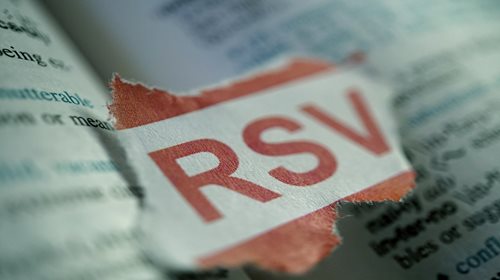
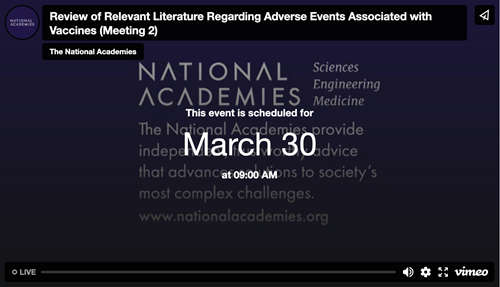
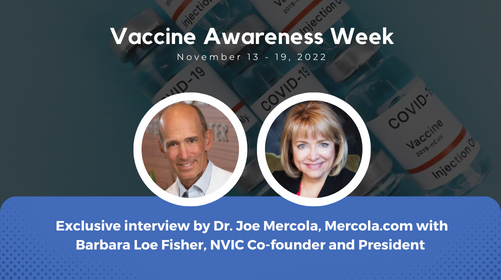


Leave a comment
Your email address will not be published. Required fields are marked with an *